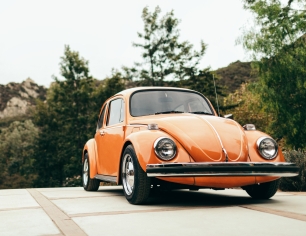How to find your classic car's value
Classic car valuation tools and appraisals can help determine the true value of your vehicle. Valuations and appraisals are based on factors like supply and demand, make, model, condition, miles, features, trim package, and much more. And like the stock market, the value of any classic car can fluctuate. Make sure you know the true value of your classic car, rather than its actual cash value, so your insurance can cover what it's really worth, including the value of its restoration, customizations, asking prices, historical interest, etc.
Explore Progressive Answers' auto editorial guidelines to find out why you can trust the car insurance information you find here.

How much is my classic car worth?
You can determine the value of your classic car by getting an appraisal that reviews current and historical asking prices. Classic car valuation tools can also provide a range of prices that your vehicle may fall into based on its condition.
For example, the Hagerty Valuation Tools provide pricing for vehicles in fair, good, excellent, and "concours" condition (meaning it could compete in a Concours d'Elegance car competition). These valuations are based on sale prices from peer-to-peer, auction, and dealer sales, as well as Hagerty's own market expertise. Learn more about what goes into Hagerty's pricing valuations.
Use the Hagerty Valuation Tools to find out what your classic car is worth. Then quote classic car insurance to get yours covered at its true value.
Why should you know your classic car's value?
Knowing the value of your classic car is critical when buying, selling, or insuring your car. For example, it can help you buy the car of your dreams for an appropriate price, sell your classic car for what it's worth, and properly insure it in case an expensive accident happens.
When it comes to insuring your classic car, knowing its value can help you get the right level of coverage. That's because a classic car insurance policy typically insures your vehicle for its true value, whereas a standard auto policy may only cover the actual cash value of a car (the cost to replace the car minus depreciation). So if you know your vehicle's value before buying a classic car policy, you can get an accurate quote and insure it for what it's truly worth.
Agreed value vs. stated value
Agreed and stated values for insurance are two common methods insurers use to determine classic car payout limits. Stated value is what you say your car is worth (potentially requiring proof), while agreed value is the insured amount you and your insurer agree on. Neither is the same as the actual cash value of your car, as that would have to factor in depreciation based on age. Learn more about agreed value and insurance.
At Progressive Classic Car by Hagerty, agreed value is known as Guaranteed Value®, which doesn't require an appraisal.* This value won't automatically change, but some insurers may want your vehicle revaluated at the beginning of each new policy term.†
Pro tip:
An in-demand, rare, or professionally and fully restored classic car is worth much more than a car that has been partially restored or one that was restored by an amateur.
How to determine your classic or vintage car's value
To find out the value of your classic car, you may need the following:
- Year, make, and model
- Body type
- Engine size
- VIN (not required by Hagerty)
- Current condition of your vehicle, including history of work or restoration
Compiling this information can help you, your appraiser, and your potential insurer identify any unique or high-demand features that add to your vehicle's value. For example, vehicle demand, rarity, restoration condition, current condition, and its ability to be restored can all affect your classic car valuation. Have these particulars ready when you use the Hagerty Valuation Tools to find out how much your collector or classic is worth.

Get a free quote for classic car insurance today
Learn more about classic car insurance policies.









